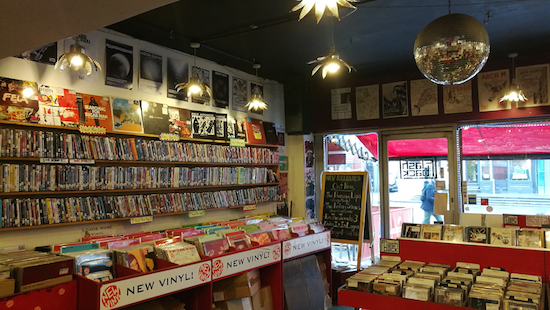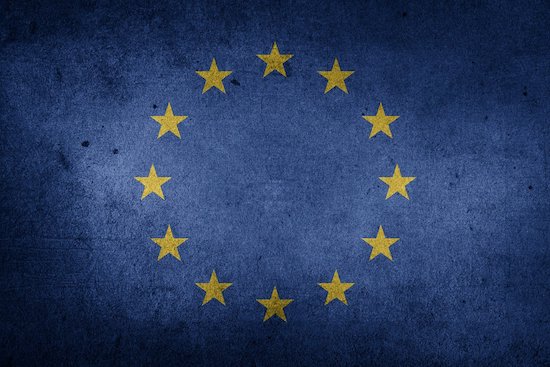"Honestly, it’s been a fucking nightmare," says Natalie Judge of the London record shop and label World Of Echo, reflecting on the last six months of business.
On July 1, VAT rules changed, meaning that all commercial goods imported into the EU are now subject to VAT and require formal customs declaration. Prior to this change, all commercial goods imported into the EU up to a value of €22 were exempt from VAT, but they are now not. Which, in short, means that sending things like records, CDs and tapes to people in the EU from the UK became a hell of lot more complicated and expensive.
Given there’s a whole thriving community of artists and labels across the country operating outside of mainstream structures, in a DIY manner, self-releasing and distributing – many of whom have been covered as part of The Quietus’ celebration of New Weird Britain – we caught up with them to gain a sense of the impact of these new rules.
Firstly, what didn’t help matters was the lack of preparation, guidance and information being provided leading up to the July changes. This left many in the industry flailing around looking for crumbs of information. Jimmy Martin, of Teeth Of The Sea and Angel Witch, also works at Flashback Records (who sell second hand vinyl) and felt the changes hit with force. "There was a sense that the true horror of the new system was hidden from even the websites themselves," he says, "leading to a proper Wile E. Coyote-style departure off a cliff face in July, in which it was quite clear that most online platforms didn’t have a clue themselves how any of the new regulations worked and were panicking like everyone else."
Mat Handley, of the tape label Woodford Halse, also felt an equal degree of chaos. "Most of the information and guidance I’ve received since July has not come from official sources," he says. "Instead I’ve had to rely on a network of similarly frustrated UK sellers and EU supporters on Twitter. The platform I use is Bandcamp, which is an amazing marketplace – it’s simple to use, its fees are fair, and it truly seems to be the best conduit between labels, musicians and fans. But their handling of IOSS has been awful."
The Import One-Stop Shop (IOSS) allows suppliers selling imported goods to buyers in the EU to collect, declare and pay the VAT to the tax authorities, instead of making the buyer pay the VAT at the moment the goods are imported into the EU. "I would have expected that forearmed with the knowledge that the tax rules were changing, they would have been ready for the changes and maybe had an idiot’s guide," says Handley. "Instead, labels and artists have had to individually email customer service to get each scrap of information."

World Of Echo
You can’t simply just get an IOSS number however; you have to acquire one through the services of an intermediary. If you’re a big company with a comfortable cash flow then it might be less of an issue, but if you’re a small independent seller who needs one to avoid customers getting stung with extra charges and hold-ups at the other end, then it’s either prohibitively expensive or you need to be able to use the IOSS number of a larger marketplace you sell through (i.e when selling on Amazon or eBay).
Bandcamp only offers up this IOSS number to those who have Enhanced Payment accounts and not all sellers have been able to access this feature. Bandcamp’s website states: "Currently, we’re only offering Enhanced Payments to a small group of artists and labels. We’ll be making this available to more sellers in the not-too-distant future – stay tuned!" The Quietus reached out to Bandcamp on a couple of occasions for comment/clarification on this system but received nothing back. Some artists who sell only through Bandcamp have shared the site’s IOSS number on social media, which, for some, when used in connection with the Post Office’s Drop & Go service, has provided them with a semi-stable workaround.
The result of all of this is a frustrating mix of packages being held by customs with clearance charges added on top of taxes and inflated shipping costs – and that’s if they make it there at all. "Prior to this Brexit stuff coming into play, we honestly never had a problem," says Judge. "We hardly had anything returned; less than 1 percent. Now, I would say pretty much 100 percent of packages that go to Germany come back. We can’t get anything into Germany at the minute. It’s taking maybe three attempts to get something over there and it costs £7.80 in postage for a single record each time, so we’re losing money on orders."
World Of Echo doesn’t have its own IOSS number. "It costs £3,000 a year… as if we can afford that, of course not," she says. "We now employ a third party handling company that takes care of the VAT fees for us. They collect the VAT on their side and we then have to repay it and also pay them a handling fee. It’s pretty weird and borderline dodgy to be quite honest. It was seemingly the only solution because you can’t get packages into Europe without this IOSS code and there’s no way that anybody can afford £3,000."
It means small scale tape label operations like Golden Ratio Frequencies, run by GNOD’s Alex Macarte, are having to bend the rules a little but even that isn’t always working. "I mark everything down as a gift," says Macarte. "But if you do anything wrong with any little bit of information, like the weight is incorrect, then it still usually gets stuck with customs or it gets sent back."
Ambient artist and publisher of Corbel Stone Press, Richard Skelton, is encountering similar issues. "Often what happens is the CD or record is held in customs for weeks. There’s no communication between the customs and the end purchaser and then it’s sent back to us. So it’s incumbent upon us to refund the customer, which for people trying to eke a living out selling their own music is more or less crippling."

Richard Skelton
By not having access to Bandcamp’s Enhanced Payment account (standard Bandcamp users receive payment for physical items directly from the buyer via PayPal and this money does not pass through Bandcamp’s hands), Skelton ends up losing out in this situation. "When refunding someone, PayPal still takes its fee," he says. "So by offering refunds, we lose money."
Handley has managed to gain access to Bandcamp’s IOSS number but that hasn’t made life easier necessarily. "Even though I now know how to comply – the clear display of the IOSS, the attached sales invoice clearly showing that the relevant tax has been paid by the buyer etc. – there are many postal services in Europe who don’t seem to be aware of the rules. I’ve got customers in Germany who are being charged tax twice, plus handling fees on every delivery. I have customers in Portugal and the Netherlands whose parcels are simply returned to me without even attempting delivery or notifying the recipient. I honestly don’t know if this is due to incompetence or unscrupulous postal businesses taking advantage of the confusion to make a fast buck. But the problem is ongoing."
Despite packages now being plastered all over with forms, labels, codes and completed paperwork (to the point where you can’t fit it all on the front of a seven-inch cardboard sleeve – although place a sticker on the back and it will get sent back), there’s still no clarity on what people are doing wrong when things get sent back. "It’s staggering how much information is on the parcels and it’s ridiculous when it comes back," says Judge. "You can chase a postman down the street and say, ‘Do you know what the issue is? What have I done wrong?’ And the answer is always, ‘I’ve got no idea, we haven’t been told, we don’t know what the issue is.’"
Every artist, label and shop owner I speak to has the same kind of stories. Robin Rimbaud, who performs as Scanner, sent a package to the Netherlands three weeks ago that still isn’t there. People are being charged €18 tax on top of shipping for one single CD of his being sent to Belgium. "It’s an incredible mess," he says. "It just means that people have given up purchasing stuff. The percentage of my UK orders versus worldwide used to be probably 60/40 in favour of worldwide and now 85 to 90 percent is UK sales. I’ve noticed a massive drop. A year or 18 months ago, I could happily sell 100 CDs on Bandcamp Friday. I sold two on the last one. Both to the UK."
Martin has seen Flashback’s sales affected too. "It’s basically just wiped out a big part of our market," he says. "I think the best way to understand it is that whereas three or four years ago, EU-based customers on Discogs would scan down the available copies of a title and see the UK titles as fair game, they now just see extra charges, hassle, expense, and just don’t order.
"The customs thing is maddening – we sell most of our stuff through Discogs but even when that website made it as easy as possible for everyone concerned, now it’s seemingly a lottery as regards whether packages turn up at all, with items rejected for seemingly arbitrary reasons at the behest of customs officials and customers regularly charged extra VAT, both on point of sale and then also at their destination."

Flashback Records
Will Palmer of Bad Omen Records thought he’d lost EU sales altogether. "At one point, I felt mail order had just gone," he says. "51 percent of my online sales were from the EU and in summer that just stopped." Judge has noticed sales plummet too. World Of Echo’s Discogs business is down 80 to 90 percent. Chris Reeder of Rocket Recordings is also feeling the sting. "I can safely say that the curveball Brexit has thrown us this year is worse than we had anticipated," he says. "It is just a pointless shit show that has cost us the majority of our European customers, which is about 30 percent of our direct to consumer base. It is affecting our distributed releases as well. As an example, a friend from Italian band Julie’s Haircut went to buy the new GNOD album from their regular Italian online store and it was retailing for €48. That is not sustainable. That affects us being able to release bands from countries like Italy as they are not going to want their album to retail in their own country for that price."
It’s turning the job of self-sustaining independent artists and label and shop owners into customer service operators because queries and complaints are coming through so frequently. "Every morning starts with answering customer queries as to where packages are," says Judge. "I’m embarrassed and frustrated because our customers think that we’re screwing it up. But there’s just been no guidance at all and you’re just blindly trying to figure this thing out."
The time involved with all the new labelling, coding and packaging is also creating a lot more work. "It’s not a labour of love anymore, it’s just labour," says Rimbaud. "This sounds so trivial and it feels like you’re just complaining for the sake of complaining but it is incredibly laborious."
For Rimbaud, the changes have broken a set-up that was perfectly functional. "It’s rapidly destroyed a very simple, very profitable system," he says. "Especially at a time in the absence of any other income from touring and the likes. It’s disheartening when you’re willing to invest your own earnings into making this thing happen and you’re entirely 100 percent independent. There are so many people like myself who don’t even have a manager or label to offer any kind of buffer or support."
The whole situation is also testing the patience of European buyers. "With the best will in the world, you have fans and they want to support you," says Skelton. "But how can they when they’re paying out of pocket or double the amount that they would pay for something that they can get domestically?" Skelton tells me of an instance in which he shipped a £10 booklet to Ireland, customs opened it and then went on his website and valued it in line with a £150 limited edition version, adding a further €40 onto the buyer’s end when it arrived. "In terms of the sales of physical artefacts, it’s almost like the death knell," he says.
Practically, logistically and financially, it’s a disaster. But there are cultural ramifications too. "It works the other way around as well," says Macarte. "There are a bunch of tape labels I used to get music from in the States and I can’t do it anymore. One ended up costing me £30 for one cassette because of postage costs. That’s absolutely crazy. Frustration and sadness are the two feelings I most have. It just feels like we’ve made things loads more difficult for ourselves and for everybody else and for a lot of these small DIY labels it’s a big community and it’s really severing us from that connection with people."
Rimbaud also suggests the power of these industries and communities in the UK has been grossly underestimated. "The people who have been negotiating all this, those in power, failed to understand that there’s an enormous cottage industry of creators," he says. "It has severely restricted the potential of creatives, and that’s not just in music. There must be so many people on say Etsy who are completely stranded who were quite happily making a living making jewellery or socks but that’s been completely restricted. You feel like you’ve been let down by a system that could actually be incredibly encouraging and positive and bring so much more to people. But it’s just essentially severed all those connections at every level. The whole notion of sharing, physically, is just being destroyed at a time when we’re already feeling incredibly restricted and isolated."

Robin Rimbaud
Martin echoes these frustrations. "There’s definitely a sense that there were no upsides to Brexit, only a considerable downside, to paraphrase David Davis," he says. "And therefore that businesses were deliberately kept in the dark. This seems absurd but is characteristic of the over-promising and deceit that’s been a regular feature of the entire phenomenon. Like a kind of governmental rictus grin in the face of all evidence and logic."
Is there a solution? "This sounds insane…" begins Judge. "But we’ve actually talked about only shipping to Europe once a month and then taking it in turns to drive across to France and then send everything from France. That’s been a genuine conversation. It’s ridiculous."
For someone who is operating at a larger scale than sending parcels from their living room, Bad Omen has taken drastic steps. "I just thought, right, okay, I’m just going to have to have a warehouse on the mainland," he says. "I was going to outsource in the UK because I can’t be bothered spending half the day packing packages and I knew some guys in the UK who have a warehouse but in the end I knew I had to get somewhere on the mainland.
"So we now ship from the EU to the EU and from the UK to the UK. That is now the biggest selling point in the item description of everything I’ve got listed because you need people to be confident. Once I did that, all the custom just came back. I’m thinking this could be a good thing. It feels like a win but in the grand scheme of things it’s still one step behind where we were last December."
Some places are giving up. "My publisher who released my last book is just not shipping to Europe anymore," says Skelton. "They’re not even risking it and you can completely understand it because it’s almost not worth the problems you incur. It’s like Brexit come home – we’re completely islanded and it brings Brexit home in a very visceral and real way."
Is there any modicum of positivity to be found here? Macarte is thinking about using the situation to try and build bridges. "I’m talking to somebody about doing a joint release with an American label," he says, "Where they do some presses in the States and I do some over here. So I guess in some ways it could open up those cross collaborations that give a bit more of a community feel." Skelton also hopes there might be some kind of way of working together through this. “Maybe there’s some kind of coalition that can happen for smaller labels," he says. "Some way of clubbing together where that enables you to leverage the power that you have in cooperating."
However, currently, there’s not much in the way of positivity or a concrete resolution for people feeling the impact of this. It remains an ongoing slog. "It’s completely disheartening and I don’t see a solution to it for the time being," says Rimbaud. Or, as Judge stresses once again, "It has been a fucking nightmare."





